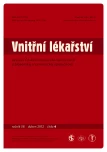-
Medical journals
- Career
Acute copper poisoning by suicidal attempt
Authors: O. Hloch; J. Charvát
Authors‘ workplace: Interní klinika 2. lékařské fakulty UK a FN Motol Praha, přednosta prof. MUDr. Milan Kvapil CSc., MBA
Published in: Vnitř Lék 2012; 58(4): 325-328
Category: Case Reports
Overview
Voluntary copper poisoning is a rare mode of suicide. We report a case of patient admitted to Metabolic Intensive Care Unit who took fatal dose of copper oxichloride. In his clinical picture dominated gastrointestinal dicomfort with the profused diarrhoea leading to the excessive fluids loss exceeding 10 liters over 24 hours. The renal and liver damages typical for copper intoxication were prevented due to the early intensive treatment (2 hours after ingestion of copper oxichlorid) including the application of copper chelator Succicaptal.
Key words:
copper poisoning – treatment by chelator agent
Sources
1. Hasan N, Emery D, Baithun SI et al. Chronic copper intoxication due to ingestion of coins: a report of an unusual case. Hum Exp Toxicol 1995; 14 : 500–502.
2. Walsh J, Crosson FJ, Bayley M et al. Acute copper intoxication. Pathophysiology and theraphy with a case report. Am J Dis Child 1977; 139 : 149–151.
3. Franchitto N, Gandia-Mailly P, Georges B et al. Acute copper sulphate poisoning: A case report and literature review. Resuscitation 2008; 78 : 92–96.
4. Faure A, Mathon L, Poupelin JC et al. Acute cupric sulphate intoxication: pathophysiology and therapy about a case report. Ann Fr Anesth Reanim 2003; 22 : 557–559.
5. Propst A, Propst T, Feichtinger H et al. Copper-induced acute rhabdomyolysis in Wilson’s disease. Gastroenterology 1995; 108 : 885–887.
6. Davis GK, Mertz W. Copper. In: Mertz W (Ed). Trace elements in human and animal nutrition. Vol. 1. 5th ed. New York: Academic Press 1987.
7. U.S. Enviromental Protection Agency. Ambient water quality for copper. Washington, DC: Office of Water regulations and standards. Criteria and Standards Division 1980. Publ. No. PB81–117475.
8. Eife R, Weiss M, Barros V et al. Chronic poisoning by copper in tap water: I. Copper intoxications with predominantly gastrointestinal symptoms. Eur J Med Res 1999; 28 : 219–223.
9. Spitalny KC, Brondum J, Vogt RL et al. Drinking Water Induced Copper Intoxication in a Vermont Family. Pediatrics 1984; 74 : 1103–1106.
10. Araya M, Olivares M, Pizzaro F et al. Community-based randomized double-blind study of gastrointestinal effects and copper exposure in drinking water. Environ Health Perspect 2004; 112 : 1068–1073.
11. Jantsch W, Kulig K, Rumack BH. Massive copper sulfate ingestion resulting in hepatotoxicity. J Toxicol Clin Toxicol 1984–1985; 22 : 585–588.
12. Müller-Höcker J, Meyer U, Wiebecke B et al. Copper storage disease of the liver and chronic copper intoxication in two futher German infants mimicking Indian childhood cirrhosis. Pathol Res Pract 1988; 183 : 39–45.
13. Oldenquist G, Salem M. Parenteral copper sulfate poisoning causing acute renal failure. Nephrol Dial Transplant 1999; 14 : 441–443.
14. Stein RS, Jenkins D, Korns ME. Letter: Death after use of cupric sulfate as emetic. JAMA 1976; 235 : 801.
15. Gunay N, Yildirim C, Karcioglu O et al. A series of patients in the emergency department diagnosed with copper poisoning: recognition eqauls treatment. Tahoku J Exp Med 2006; 209 : 243–248.
Labels
Diabetology Endocrinology Internal medicine
Article was published inInternal Medicine

2012 Issue 4-
All articles in this issue
- S-100B protein elevation in patients with the acute coronary syndrome after resuscitation is a predictor of adverse neurological prognosis
- Short-term prognosis and treatment of patients hospitalized for acute heart failure in a regional hospital without a cardiocentre
- Risk stratification in patients with Brugada syndrome
- The importance of NGAL and cystatin C biomarkers in cardiovascular diseases
- New knowledge of the pathogenesis of Crohn’s disease
- Drug interactions in the elderly with diabetes mellitus
- Diabetes mellitus and dementia
- Specific diabetes education in children
- Interleukin-1 receptor blockade with anakinra provided cessation of fatigue, reduction in inflammation markers and regression of retroperitoneal fibrosis in a patient with Erdheim-Chester disease – case study and a review of literature
- Pervitin induced acute myocardial infarction
- Hypergastrinaemia without detection of gastrinoma
- Acute copper poisoning by suicidal attempt
- Hidden cystic fibrosis in patient suffering from sarcoidosis
- Internal Medicine
- Journal archive
- Current issue
- Online only
- About the journal
Most read in this issue- Pervitin induced acute myocardial infarction
- The importance of NGAL and cystatin C biomarkers in cardiovascular diseases
- Acute copper poisoning by suicidal attempt
- New knowledge of the pathogenesis of Crohn’s disease
Login#ADS_BOTTOM_SCRIPTS#Forgotten passwordEnter the email address that you registered with. We will send you instructions on how to set a new password.
- Career

